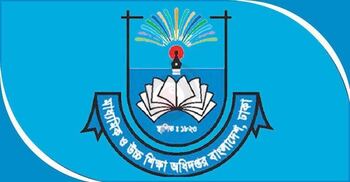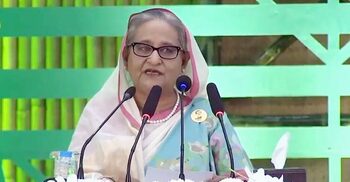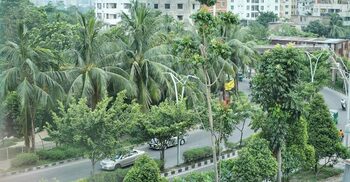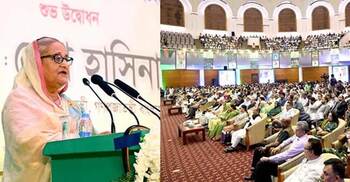Most of country's development against environment: Syeda Rizwana Hasan

Though some of Bangladesh's ongoing development benefits people, most of it goes against the environment, said Syeda Rizwana Hasan, the chief executive of the Bangladesh Environmental Lawyers Association (BELA).
Syeda Rizwana Hasan, also a Supreme Court lawyer, has been working to protect the environment, including the prevention of cutting hills, deforestation, and filling reservoirs. In recognition of these works, she received various awards, including the Goldman Environmental Prize, and the Magsaysay Award.
She talked to Jago News on the occasion of World Environment Day 2024. Jago News's staff reporter Musa Ahmed interviewed her.
Jago News: Dhaka is one of the least liveable cities. You are a resident of this city. How are you here?
Syeda Rizwana Hasan: There is no chance to say I am fine. I love this city. That's why, I get angry seeing the frenzy to destroy it. My anger increases further when Dhaka is given the worst polluted and least liveable city title.
Jago News: Air pollution in district towns, including Dhaka, is continuously rising. What role the government should play in reducing pollution?
Syeda Rizwana Hasan: I have doubts whether the government has will in this regard. I, so far, did not see something effective and specific the government did to control the pollution. But I am hopeful about our new environment minister. Let's see if he can do anything as an exceptional person in a huge government force.
Jago News: Is it possible to make Dhaka city liveable?
Syeda Rizwana Hasan: It's not impossible to make Dhaka city liveable and for it, a fair city vision is needed where land management will be made based on equality and people-oriented; institutions must be kept outside the influence of politics and bureaucracy; and neutral professional will be appointed. Besides, the environment must be included in the power and duty of RAJUK with zero tolerance against corruption.
It is necessary to ensure the accountability of this institution. No new land will be allowed for influencials by RAJUK. It is necessary to think about residence for poor people. RAJUK is the sanctuary for land grabbers. It must work against land grabbers with a war mentality. Taking lessons from why a Detailed Area Plan (DAP) fails, a program must be taken to implement. We need the standards that civilized cities maintain.
The work to restore Dhaka must start right now with people's participation. If South Korea can, why can't Dhaka dwellers? Positive changes will come here if we have leadership like South Korea.
Jago News: Different associations of the government, including city corporations, cut trees of road dividers and footpaths in the name of infrastructural development. What do you say about them?
Syeda Rizwana Hasan: Those who cut trees in the name of beauty, their thinking is questionable. They do this only to reward political activists of their own party. The reality of protecting the city's environment is contrary to this.
Jago News: Will there be more challenges in environmental protection in the future?
Syeda Rizwana Hasan: Heatwaves and irregular rainfall will rise nationwide due to climate change. The number of migrants will increase in this city if development is not decentralized and adaptation is not enough at the local levels. Dhaka may be abandoned at one stage if the trend of endangerment of the environment is not stopped, experts fear.
Jago News: Now Dhaka has around 2 crore population. How to reduce people's tendency toward Dhaka?
Syeda Rizwana Hasan: A major portion of the 2 crore people of Dhaka resides in slums. Dhaka is not their preferred habitat. They live in slums facing river erosion or failing to get jobs. They will return to the village if they are rehabilitated and climate adaptation is done correctly. Those who don't have their own address in Dhaka will also return to their home district if development is decentralized.
Jago News: Reducing carbon emissions to prevent climate change and environmental pollution is a much-discussed topic globally. Why is Bangladesh behind in that place?
Syeda Rizwana Hasan: Bangladesh thinks the destruction of the environment is needed for development. It's not true at all. Though some of Bangladesh's ongoing development benefits people, most of it goes against the environment.
The government is actually ready to give up hills and rivers in the name of industry and road development. To save from the effects of climate change, the government must concentrate on the protection of natural resources because the country will have to survive using these natural resources if developed countries do not provide financial assistance to tackle the changes that will happen due to climate change.
As much as Bangladesh is eager to get money from the developed world to prevent climate change, it is not so interested in ensuring proper use of the money or protecting the matter of natural resource-based adaptation. Bangladesh is now more concentrated on mega projects and its mentality is that development means mega projects. The government has no perspective and belief that these mega projects can be made environment-friendly.
MMA/MSU





